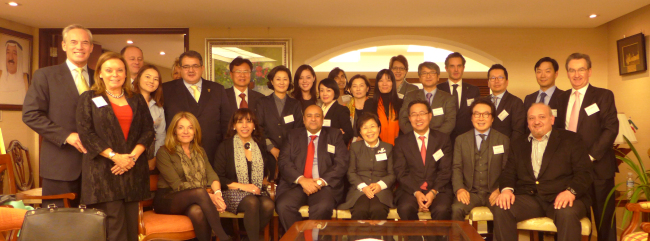Capitalism survived by extolling the virtues of freewheeling freedom and individual success, but the current model cannot continue, Jhun said, referring to the paradigm-changing perspective of American intellectual Jeremy Rifkin.
Rifkin’s vision of the “third industrial revolution” ― based on renewable energy, socially responsible business and wirelessly linked life ― will reshape the nature of global capitalism, Jhun said.
“Korea achieved the double feat of industrialization and democratization, lifting our (per capita) income from less than $100 in the 1960s to $25,000 currently. We set our goals on (becoming) a ‘developed nation’ with a $40,000 salary, but do our children share this view?”
Jhun emphasized that today’s emerging business models are based on the concept of the “sharing economy” ― sharing and accessing scarce resources rather than raking up wealth. Fortuitously, the coming Internet of Things era can help recoup the values of a compassionate community by facilitating people-to-people exchanges, according to Jhun.
The younger generations are also much more environmentally sensitive than the older generations, who, in many cases, chose short-term profits over sustainable growth.
Jhun said that Rifkin’s idea is “not some distant reality, but an unfolding reality.” He pointed to Samsung’s shrinking profits in smartphone sales, overtaken by the rapidly growing Chinese electronics firm Xiaomi Inc.
The reason for this, according to Jhun, is that Xiaomi listened to the voices of its engineers and consumers when it developed its operating system, which allowed the organization to continually reinvent itself. Samsung, a “team of professional footballers,” lost to Xiaomi, a “team of middle-schoolers with ‘collective intelligence,’” Jhun said.
The pyramid-shaped power structure endorsed by conglomerates ― for mass production and efficient management ― will not work in the new age in which power is decentralized, horizontal and autonomous, Jhun said; the new leader is a communicating coordinator, not an all-knowing administrator.
“But our school system still operates like a Ford factory, churning out students with industrial mindsets,” Jhun added. “We must question ourselves whether our current ‘competitive edge’ will stay competitive into the future.”
Forming a favorable environment for starting an innovative business is vital, Jhun said. “The government only pushed university graduates to launch start-ups without formulating a roadmap and ecosystem. With no market potential, the young hopefuls fell into debt.”
In order to create a society in which everyone’s “dream and talent” can be fulfilled, Jhun said that Korea’s education must be revamped to inspire empathy, mentor insight and foster dreams. The 3.5 trillion won ($3.1 billion) annual national budget for education must be overhauled.
Jhun said that renewable energy, expected to replace nuclear and fossil fuel energy, will be the next “vast blue ocean” in Korea. By locally managing the supply and demand, it can empower local self-government and create new jobs.
Korea’s agricultural industry, which has long been plagued by low income and harsh labor, can also benefit by digitalizing the production and exporting the produce globally. The concerns over the influx of foreign produce through the free trade agreement can be solved; and the younger and baby-boomer generations can live together by “healing” rather than toiling.
To create a “happy countryside,” the government must mastermind the process and build commercial infrastructure, Jhun emphasized, adding that a successful experiment will be benchmarked in other regions.
Jhun is currently planning a project ― the “Korea Knowledge Valley” ― in Bundang, south of Seoul, which he hopes will serve as a precedent for the creative economy. By turning a decrepit sewage disposal plant into a space where companies and students can join forces to forge concrete business models, Jhun aims to bring together talented individuals in the fields of art, education, culture and technology.
Founded in 2006, the CQ Forum has striven to promote professional networking and introduce Korea to the world. Its 300 members participate in multicultural gatherings without restrictions on age, nationality or profession.
For more information, call (010) 3004-0441 or (010) 3729-1843, or send an email to
cici@coreaimage.org or
jwshchoi@hotmail.com.
By Joel Lee (
joel@heraldcorp.com)








